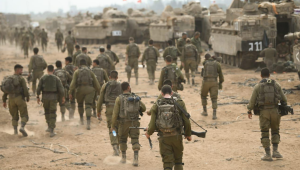By Robbie Gramer and Jack Detsch\Foreign Policy
Photos: YouTube Screenshots\Wikimedia Commons
As Israel wages its war against Hamas in the Gaza Strip, there are prospects of a new war brewing on Israel’s northern border against the Iran-backed Hezbollah militant group based in Lebanon. The United States and other Western powers are scrambling to try to prevent it, but diplomatic efforts to keep the war in Gaza from igniting conflicts in Lebanon and elsewhere in the region have already failed in some respects.

Militant groups that act as proxies for Iran—Israel and the United States’ arch regional rival—have ramped up attacks as Israel continues its military campaign in Gaza, from Houthi rebels in Yemen targeting commercial maritime traffic in the Red Sea to salvos of missiles targeting U.S. military bases in Iraq and Syria.
A failure to contain Israel-Hezbollah tensions could be much deadlier, however.
The bigger war that everyone fears
Hezbollah, backed by Iran, is considered one of the most powerful and heavily armed nonstate groups in the world. All sides agree that an Israel-Hezbollah war would be devastating.
But history is rife with examples of wars breaking out even when no side wants one. Given how tensions in the region are already at a boiling point, all it would take is one ill-placed or ill-timed spark to alight a major new front.
“The longer this goes on, the greater the possibility of some mass casualty event which pushes both sides over the edge,” said Aaron David Miller, a former longtime U.S. diplomat and Middle East peace negotiator who now works at the Carnegie Endowment for International Peace think tank.
Upping the ante is the fact that U.S. officials now assess that the risk is rising that Hezbollah could begin targeting U.S. troops or diplomatic personnel in the Middle East, or even plan attacks in the U.S. homeland, according to Politico.
The deadliest “what if?”
From the first days of the Israel-Hamas war, the Hezbollah question—whether the group would join Hamas’s war effort by launching a full-scale assault on Israel from Lebanon—has hung over the heads of U.S. and regional powers engaged in crisis response. Hezbollah’s military capabilities, with an estimated 100,000 to 150,000 missiles and rockets aimed at Israel and tens of thousands of fighters in its ranks, far outstrip those of Hamas. Experts warn that an Israel-Hezbollah war could be far deadlier and more drawn out than Israel’s operations against Hamas in Gaza, which have killed an estimated 22,000 Palestinians so far, according to health authorities in the Hamas-controlled territory.

Blinken’s warning.
During his most recent trip to the Middle East this week—his fourth since the war began on Oct. 7, 2023—U.S. Secretary of State Antony Blinken warned that the conflict could spill beyond its current contours. Behind the scenes, Blinken’s team has focused much of its efforts on both crafting a postwar plan for Gaza and heading off a major Israeli conflict with Hezbollah. “This is a moment of profound tension in the region. This is a conflict that could easily metastasize, causing even more insecurity and even more suffering,” Blinken said while visiting Qatar on Sunday.
Meanwhile, another top Biden administration envoy, Amos Hochstein, is in Lebanon this week following meetings in Israel to see if there’s room to negotiate on border disputes between the two countries in a bid to dial down the tensions. He has his work cut out for him, to say the least, as Robbie reports this week.
100,000 tons of diplomacy.
The threat from Hezbollah is a key reason why the Biden administration deployed a U.S. aircraft carrier strike group and other warships to the Eastern Mediterranean in the months after the Israel-Hamas war started as a deterrent signal to head off any major Hezbollah offensive against Israel.
Ultimately, however, officials and experts widely agree that Iran has the deciding vote on whether Hezbollah should dive into the conflict. “Hezbollah does have a seat at the table, but the Iranians, at the end of the day … they make the decisions, and what they say goes,” said Phillip Smyth, an expert on Middle East terrorist groups.

Iran’s calculus.
For now, Iran seems content with the status quo of dragging Israel through a grueling war in Gaza that has alienated much of its support on the world stage, as well as upending maritime trade routes through the strategic Red Sea chokepoint with Houthi attacks. In short, Tehran is already getting a lot for a relatively low cost—keeping thousands of Israeli soldiers occupied near Lebanon’s borders with the threat of a war there, while saving its biggest asset, Hezbollah, in reserve and skirting any direct role in the fight itself.
“Iranians are notorious for fighting to the last Lebanese, to the last Yemeni, to the last Syrian, to the Palestinian, to the last Iraqi, without implicating themselves, and this time is no different,” said Bilal Saab, a regional security expert at the Middle East Institute think tank.
Thus far, Hezbollah has limited its role in the war to cross-border fire targeting northern Israel, a clear sign in the eyes of U.S. officials and regional experts that Hezbollah’s patrons in Tehran don’t want a full-fledged war. Israel, meanwhile, has issued public warnings that it could launch a major military offensive against Hezbollah but has so far held off from doing so, as the bulk of its forces is bogged down in fighting in Gaza.
A powder keg waiting for a spark.
The risk of miscalculation is high. On Tuesday, Hezbollah attacked an Israeli army base in Safed, located in northern Israel near the Lebanese border. This attack came just a day after a senior Hezbollah military commander, Wissam al-Tawil, was killed by an Israeli drone strike. A senior Hamas official, Saleh al-Arouri, was also killed in a strike in Beirut, though the Israeli government has not acknowledged its likely role in that killing.
Then there’s the political climate in Israel, where Prime Minister Benjamin Netanyahu appears to be bowing to the far-right members of his governing coalition in how he carries out the war as he scrambles to stop hemorrhaging political support.
Red lines.
One major lingering problem is that both sides don’t have a clear idea of what the other’s red lines are. Israel may perceive the targeting of Hezbollah commanders as fair game in the so-far limited skirmishes along the Lebanese border, but Hezbollah may not. Similarly, Hezbollah could launch what it sees as skirmish attacks against Israeli bases, but Israel could perceive those as a major attack.
“There’s no mutually agreed-upon definition of what escalation is for both sides,” Saab said. “I’m not sure that intentions on their own to prevent a major war … [are] sufficient for actually preventing one.”


Source: Robbie Gramer and Jack Detsch\Foreign Policy






